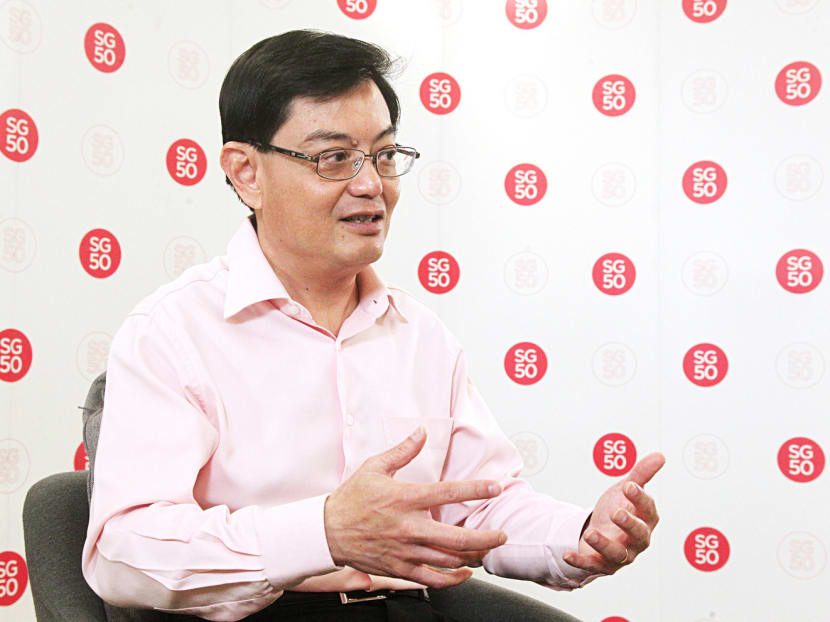Heng: Bold changes needed in education
SINGAPORE— After imparting generations of Singaporeans with numeracy and literacy skills, the Republic’s education system now finds itself at a crossroads: Should it continue with a narrow focus on grades and exams, and descend into a spiralling paper chase and an expanding tuition industry just like many other countries?
SINGAPORE— After imparting generations of Singaporeans with numeracy and literacy skills, the Republic’s education system now finds itself at a crossroads: Should it continue with a narrow focus on grades and exams, and descend into a spiralling paper chase and an expanding tuition industry just like many other countries?
Or should it embark on a bold transformation and focus on what is truly important by building strong values and deep skills in people throughout their lives — a path that no society has charted out fully?
As far as Education Minister Heng Swee Keat is concerned, the choice is evident. “To me, the path is clear. It is to do everything we can to be people of deep skills and strong values. We take the pioneering path, to nurture Singaporeans who are inventive, resilient and caring,” he said yesterday.
But he stressed that the transformation could take place only when Singaporeans’ mindset about education changes from one about academic learning to one about “learning in every domain, any time, anywhere for a purposeful, fulfilling life”.
Speaking during the Committee of Supply debate for the Ministry of Education (MOE), Mr Heng noted that other countries are also facing the same dilemma and questioning the future of education. In fact, Singapore has a head start, he said.
“I have been reading their projections ... (and) I realise that much of what they envision in the future, we are doing now,” he added. “And what is special about our mission is that we are not thinking about the future of education in just one school or one university. We are thinking about the future of education for our whole nation.”
He pointed out that in the past few years, Singapore has built on changes already made to the education system and made important moves in the right direction. There was a renewed focus on values and character, holistic education was strengthened, school rankings were abolished and support for weaker and special needs students was enhanced. “All these changes have laid the groundwork for a transformation that creates a better future for Singapore,” Mr Heng said.
“We developed new ways of learning in our schools, made every school a good school, expanded applied pathways in tertiary education,” said Mr Heng, adding that a series of SkillsFuture initiatives announced in this year’s Budget was built on recommendations by the Applied Study in Polytechnics and ITE Review committee.
Mr Heng called on Singaporeans to go beyond learning for grades and “learn for mastery”. To that end, schools are embarking on applied learning programmes, so students can match interests with opportunities and apply knowledge in real-life situations.
At the same time, the MOE is strengthening education and career guidance efforts across all levels. “We are not channelling students to specialise early,” Mr Heng said. “By exposing students to possibilities, we empower them to make better choices and choose suitable pathways.”
Referring to the SkillsFuture initiatives, he stressed that learning had to take place throughout life. Among the measures is the Earn and Learn programme, under which polytechnic and Institute of Technical Education graduates undergo apprenticeships. Adult learners can, at their convenience, tap more than 300 modular bite-sized courses in a wide range of areas such as aviation and engineering. The courses, which last between 30 and 60 hours, will be offered by universities or polytechnics from June.
But Mr Heng cautioned that in the pursuit of new skills, Singaporeans must not end up chasing another form of qualification. “Our focus must be on the ends — acquiring, mastering and using deep skills,” he said.
Mr Heng reiterated that Singapore’s education system had come a long way. “But there were also inadvertent negatives,” he said. “A strength — in focusing on academic grades — can be overdone and become a weakness, as we leave little time to develop other attributes that are necessary for success and fulfilment.”
During the MOE Committee of Supply debate, several Members of Parliament urged the ministry to reduce stress levels in schools and rein in the private tuition industry. Mr Heng noted that embarking on the transformation would go some way to addressing these issues.
“As long as there is only one path to success, the pressure will manifest itself at some point,” he said. “When we have an abundance mentality, then success is not defined by one pathway, but by many pathways.”







